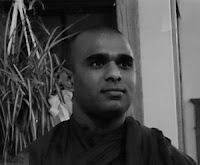
by Bhante Sathi
If someone were to ask you, "What is the purpose of your life?" what would you say? You may list many reasons or you may draw a blank. If you do come up with an answer, it may not be the same answer you gave in the past. In reality, this is the most complicated question you could ever ask yourself.
On one hand, your parents created you; this was not your choice. Your parents raised you and educated you. You finished school and began to support yourself. Then you may go on to create your own family. This is the system your family has followed for generations, that you pass on to your own children.
I have a middle-aged friend that lives alone and unmarried. Recently, a few people asked me about her. They imply that this person is not normal because she does not have anything people are supposed to have at her age. The reality is, my "normal" is not "normal" for this person. This is what we need to pay attention to: What is this "normal"? We define life for others based on ouw own expectations. If someone goes outside the boundaries of these expectations, we think there is something wrong.
A mindful person sees this as thinking inside a box. With education and experience, we change the way we think and learn not to be narrow-minded. This helps us to become open and free, like one who moved from a small room to a bigger house. That freedom comes from having an open mind.
Yet, that is also a bigger box. A meditator notices these boxes all the time and continually breaks those boxes. It starts in this moment. This moment was not planned by anyone, so what is the reality?
We have a fresh future before us that we have never experienced before. Yet, we expect the future environment to be the same tomorrow and next week. If a friend gains or loses weight we notice because it is not the same as before.
We always want to see what we expect. We always listen to what we want to hear. Once we really start to listen, we see that we are continually creating a stereotype.
A gardener is similar to a meditator in the sense that a gardener allows surprises. This is the nature of life: last year was a great year for raspberries; this year the raspberries were abundant. Yet, in daily life we only allow the surprises that we want. For example, your spouse may change over the years in a way you did not expect. It is unpleasant when your house begins to decay. A dent in the car brings anger. Why are these events any different than a garden crop? The gardener can see that a flower may bloom for a day, then it may turn into something else or it may die. That's alright because it's nature. You can add some fertilizer to help it along, but in the end, nature takes its course. If humans are natural beings, why do we expect that our plan for life will be any different?
Meditators practice looking at the present moment without attaching to it, like the gardener who allows surprises to come and go. The difference is, meditators bring that attitude into everything. Whatever exists in this moment, the meditator accepts it as it is. If something grows, the meditator notices. If it needs water of fertilizer, the meditator attends those needs. But the meditator has no need to complain if everything doesn't grow according to plan.
When the we see something is unbeneficial, we should have a clear mind about the appropriate course of action. Meditation helps one to take action without negativity. When we allow life to surprise us, we can maintain a calm, quet mind. That means observing and accepting nature as many meditators and yogis have done for centuries.
We create ourselves within this system. Stepping out of that box is a hard thing to do. Meditation helps us to observe that, to notice that, and to step out of that. This allows us to take action, yet allow everything to surprise us.




No comments:
Post a Comment